The Third International Conference on Humanistic Foundation and Cross-cultural Understanding of Sino-American Relations, held by the Center for American Studies, Southwest Jiaotong University finished successfully. The conference lasted two days from August 15 to 16 and was held online due to the Covid-19 pandemic. The conference, comprised of a keynote speech forum and a President's Forum, proves to be a fruitful event with a broad participation. A large number of world-famous scholars were invited to address keynote speech, namely, Prof. Chih-ping Chou (Princeton University), David Pickus (Shandong University), Assistant Prof. Mazhao (Washington University in St. Louis), Prof. Michael Berry (University of California, Los Angeles), Prof. Guo Meizhu (University of California, San Diego), Prof. Huqiang (Dean of School of foreign languages of Xiangtan University), Prof. Liangxia (Washington University in St. Louis), Prof. Fan Jinghua (Nanyang Technological University), Prof. Chu Chengzhi (University of California, Davis.), Prof. Jie Zhang (Trinity University) and Assistant Prof. Li Zhou (Southwest Jiaotong University).
The President's Forum was joined by many prominent scholars and presidents of elite universities in China, viz. Prof. Peng Qinglong, Deputy Dean of the School of Foreign Language of Shanghai Jiaotong University; Prof. Shijian of the College of Foreign Languages and Cultures of Sichuan University; Prof. Guo Yingjian, Dean of the School of Foreign Languages of the Renmin University of China; Prof. Zeng Yanyu, dean of the Foreign Studies College of Hunan Normal University; Prof. Wang Zhanpeng, Deputy Dean of the School of English and International Studies of Beijing Foreign Studies University; Prof. Li Jianbo, honorary dean of College of Liberal Arts of Nanjing University of Information Science & Technology and Prof. Li Chengjian, Dean of School of Foreign Languages of Southwest Jiaotong University.
The seminar kicked off at 8:30 a.m., August 15. Li Chengjian, Dean of School of Foreign Languages (SFL) of Southwest Jiaotong University (SWJTU), gave an opening speech where she foremost extended warm welcome to all guests and scholars attending the seminar and gave her gratitude for their supporting the SFL and the American Studies Center (ASC) of SWJTU. She noted, “The 5th annual meeting is a special one considering the point where China and the U.S. hold a special and sensitive relation, which requires us to explore how to build an academic community with shared future through the seminar so as to promote more diversified and productive academic exchanges which focus on not only the humanistic exchanges between two countries but also a new pattern, say, online dialogue, of such exchange. At last, she wished the seminar a full success and welcomed the guests and scholars to visit SWJTU and the ASC by themselves when the pandemic is over.
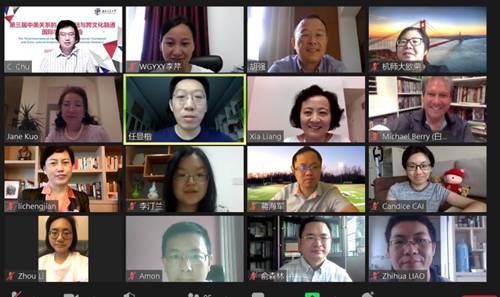
(online meeting)
Then, as a member of the the academic committee of ASC, Prof. Chu Chengzhi from University of California, Davis gave his speech on behalf of the center. He said, “the crisis is an opportunity in a difficult time which can be seized to promote reform and development pushed by the hardship.” Another opportunity brought about by the pandemic can be shown by an increase in the number of guests and scholars. He also pointed out despite the current difficulties in promoting the Sino-American relation and people to people exchange, we need to remain confident and persistent. We should be more patient and sympathetic, more compassionate and modest, and think about the problem earnestly with a future perspective. Our center strongly believed that humanistic approach and cultural integration are the key to long-term problems. At last, after wishing the seminar a full success, he began hosting the first keynote speech.
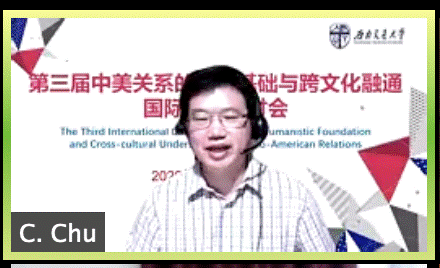
(Prof. Chu Chengzhi hosting the first keynote speech)
Six scholars attended the first round of the keynote speech forum. First, Prof. Chih-p’ing Chou from Princeton University delivered his speech titled Writing Reform in Modern Chinese Intellectual History:In defense of Chinese Characters, where he gave a brief review on the development of the Chinese characters in the past century. He pointed out, after Sino-Japan War and the May Fourth Movement, many scholars lashed out at the Chinese characters and believed it should be abolished. This was a bias of wrong direction, undermining the development of the Chinese characters in the past hundred years. They regarded the abolishment of Chinese characters would salvage China from subjugation. With a narrow view that the Chinese characters were obsolete and over-complicated, they were not aware that the revitalization of the Chinese language hinged on the revitalization of the country, and it was with the characters that Chinese culture can be passed on.
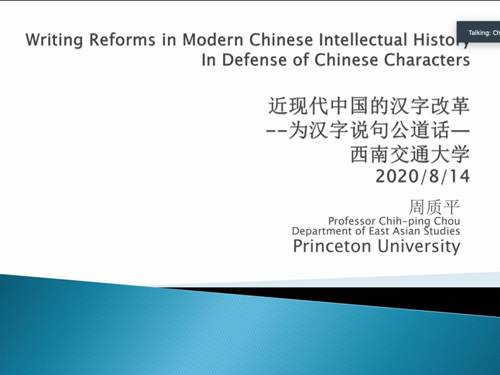
(Speech by Prof. Chih-p’ing Chou)
The second speaker was David Pickus from Shandong University. Named Enagaing Chinese Studens in American Literature: A New Plan For Partnership between Students and Faculty, his speech was drawn from his 6-year teaching experience in China. He believed that at the unusual moment, we should strengthen the engagement of Chinese student in learning American literature, particularly realistic novels, which would not only contribute to a closer partnership between students and faculty, but also help students develop a deeper understanding about the US and current situation. He also talked about how to read American literature effectively, emphasizing the importance of intensive reading.

( Prof. David Pickus )
The third keynote speech was given by Prof. Mazhao from Washington University in St. Louis. In his speech Lessons to Learn:Confucius Institutes and New Challenges in Sino-America Educational Exchanges, he reviewed the developments and changes of the Sino-American relation since its establishment about 40 years ago. He also analyzed the criticism about the Confucius Institute in terms of its founding, teaching content, regulations, relations with the governments and so on under the new circumstances. Lastly, from the perspective of the Confucius Institute, he analyzed the deeper meaning of renaming the Confucius Institute Headquarters (Hanban), which helped us to reflect on and research into the current situation and challenges in Sino-American educational and cultural exchanges.
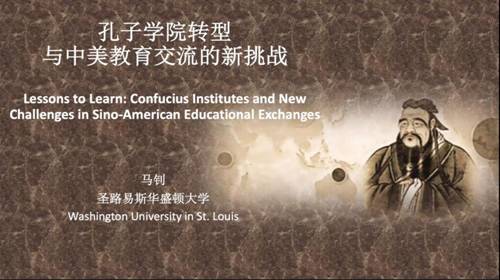
(Speech by Prof. Mazhao)
The forth keynote speaker, Michael Berry from University of California, Los Angeles, delivered Sino-American Cinema in Transition. In light of Chinese and American cinema, he summarized the relations between Hollywood and Chinese film industry diachronically. He also pointed out new challenges, new relations and new phenomenons reflected by cinema in Sino-American ties. By analyzing challenges faced by Chinese and American cinema industry, he further reflected on issues such as cultural cold war. He believed Chinese film industry, which less depended on the international market, had an advantage over the Hollywood in face of such challenges.
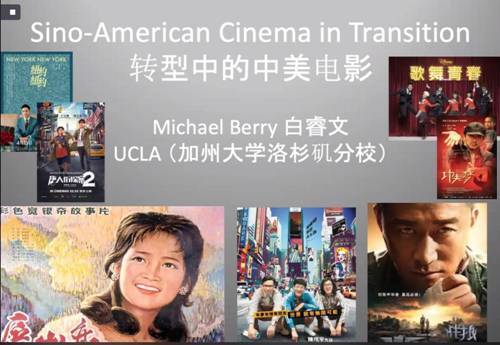
(Speech by Michael Berry)
The fifth speaker was Prof. Jane Gou from University of California, San Diego. Her speech was Communicative Language from a Cultural Perspective that was divided into 4 aspects: the “Five Cs” standard put forward by the American Council on the Teaching of Foreign Languages, cultural concepts, cross-cultural theories and history of Sino-American relation. She put forward that we should know culture and its value so as to realize a smooth and effective cross-cultural communication, which is also miniature of the whole process of cross-cultural exchange.
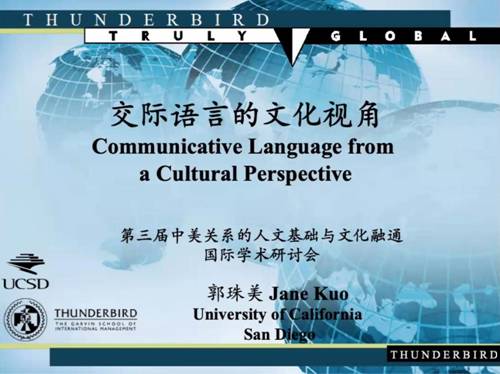
(Speech by Prof. Jane Gou)
The last keynote speech in morning’s forum was delivered by Prof. Huqiang, Dean of School of foreign languages of Xiangtan Udniversity with the title “Americanization” and “Englishness” in Chesterton’s Essays. He first generalized a status quo that more and more socialists believed social transformation should be realized generally from the perspective of society and nature where human lives. In light of this view, he further analyzed Chesterton and his work, including the collision between his “Americanization” and “Englishness” via aesthetics, rhetoric and emotions; how his imperialism, lifestyle, cultural recognition and progressive narrative become a public topic; and how the changes in social attitude and characters was reflected by his acceptance, adaption and resistance to Americanization.
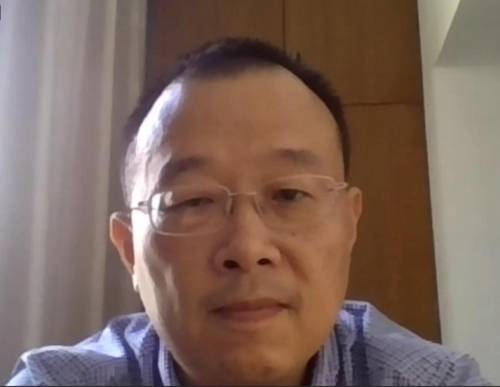
(Prof. Huqiang)
In morning’s forum, six speakers showcased their in-depth thinking on the Sino-American cultural ties through their keynote speeches from the point of cultural transformation, education development, research on thought, literature research and cross-cultural communication, which were significantly meaningful and highly enlightening. The audience also discussed with the speakers in Q&A session.
The president forum started at 2:00 p.m., August 15. Under the theme Talents Cultivation of International and Regional Studies under the Discipline of Foreign Languages and Literature, the forum was hosted by Professor Sun Xiaomeng from Beijing Foreign Studies University (BFSU).
She first noted the increasing international standing of China allowed more room for the development of International and Regional Studies. It was also a key issue in this forum. In addition, foreign languages disciplines and International and Regional Studies were deeply connected. The quality and method of the cultivation of talents in foreign languages disciplines has a direct and important influence on International and Regional Studies.
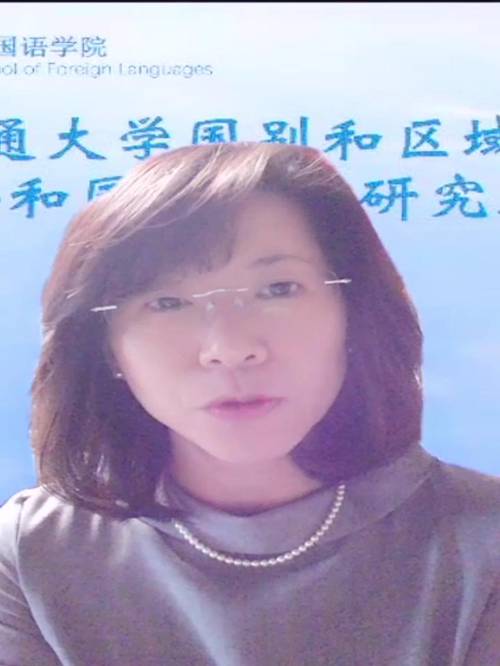
(Prof. Sun Xiaomeng)
The first speaker, Peng Qinglong, is the member of foreign language discipline evaluation group of the State Council and deputy dean of School of Foreign Language of Shanghai Jiaotong University. In his speech Humanistic and Inter-Disciplinary Foreign Languages, he firstly listed the stacked problems in international and regional studies since the five major research orientations replaced the previous 13 secondary disciplines. Then, given the debate between natural science and humanities, Professor Peng clarified that different characteristics were shown by the eastern and western studies, which required a combination between the east and west methods to have a deeper understanding of the world where the foreign language discipline mattered. After that, Professor Peng mentioned the important role of science and technology in the development of humanities, and at the same time humanities should give full play to its regulatory function to build a "scientific and humanistic community of shared destiny" and to construct an academic discourse system of both science and humanities with Chinese characteristics. Finally, he noticed the humanistic interdisciplinary attributes of foreign language discipline, and made clear the basic academic research methods of interdisciplinary literature research.
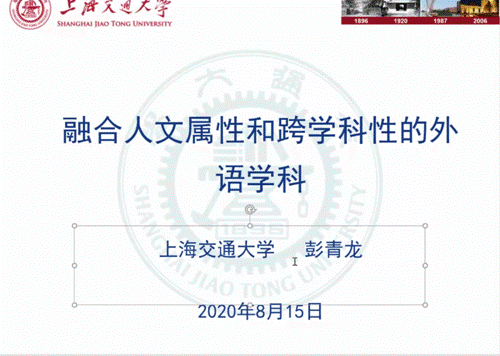
(Speech by Prof. Peng Qinglong)
The second speaker, Prof Shi Jian, is the former vice president of Sichuan University and a senior expert in EU research. In his speech Determination and Orientation: the International and Regional Studies of Foreign Language Discipline Under the New Framework of Liberal Arts, he explained how international and regional studies facilitated the building of the Belt and Road Initiative from cultural perspective. Otherwise, he presented the development and achievements of international and regional studies as well as some being-conceived orientations in Sichuan University by showcasing its curriculum construction and talents cultivation at bachelor, master and doctor levels.
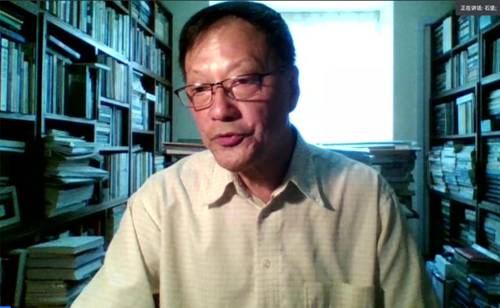
(Prof. Shi Jian)
Prof. Guo Yingjian, Dean of the School of Foreign Languages of the Renmin University of China, was the third speaker whose title was Thoughts on the new orientation of International and Regional Studies. Professor Guo in the first place clarified the conception of international and regional studies and gave his thought on how to deal with the integration reflected by the five major research orientations under the discipline of Foreign Languages and Literature. He made clear the differences between the school of international relations and the school of foreign languages in conducting international and regional studies. Then, he raised two questions. One is the difference and connection between the international and regional studies of foreign language discipline and the international politics in the school of international relations; the other is how foreign language scholars conduct international and regional research. On this basis, Professor Guo put forward some suggestions on such studies of foreign languages discipline.
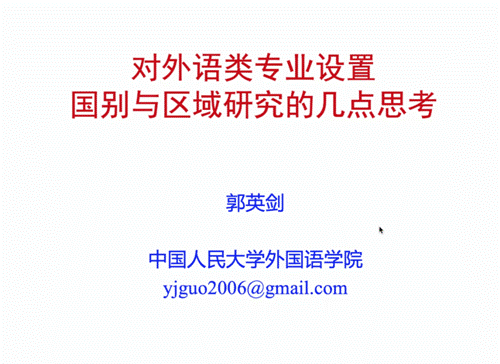
(Title of Prof. Guo Yingjian’s Speech)
The fourth speaker, Prof Zeng Yanyu, Dean of the Foreign Studies College of Hunan Normal University, gave the speech entitled The Building of Talents Cultivation System of International and Regional Studies and Fostering Interdisciplinary Foreign Language Talents Under the New Settings of Liberal Arts. She foremost indicated the vital importance of language learning in the talents training of international and regional studies in foreign language schools. She analyzed the double degree system of one foreign language plus x and the importance of orienting students to improve cross-cultural ability. In the end, she formulated a classification of excellent compound foreign language talents, viz. top-notch innovative talents, academic talents and application-oriented talents which are deemed as three cultivation orientations and requires supporting systems and training methods.
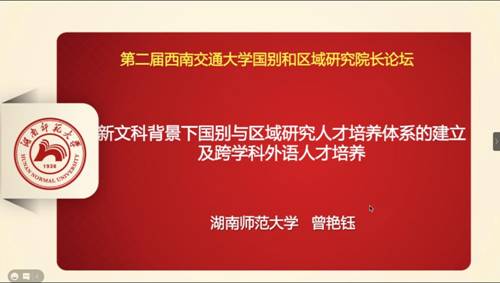
(Title of Prof. Zeng Yanyu’s Speech)
Prof. Wang Zhanpeng, Deputy Dean of the School of English and International Studies of BFSU & the Director of British Studies Centre, served as the fifth speaker who delivered the speech Reflections on the Cultivation of International and Regional Research Talents under the English Discipline, Taking the School of English and International Studies of BFSU for Example. The director first discussed the role of foreign language talents training in the disciplinary building of international and regional studies. Then, he generalized the talents cultivation of the the discipline of English language and literature in BFSU. In the end, he put forward his conclusions as follows. Firstly, English majors should step up their engagement in the academic discussion at home and abroad on the subject characters of national and regional research; secondly, the cultivation of talents for national and regional studies should go beyond the dispute of subject ownership; thirdly, we should instil national awareness to such talents in all aspects so as to facilitate the building of related research base and think tank. Finally, we should learn from each other and strengthen cooperation.
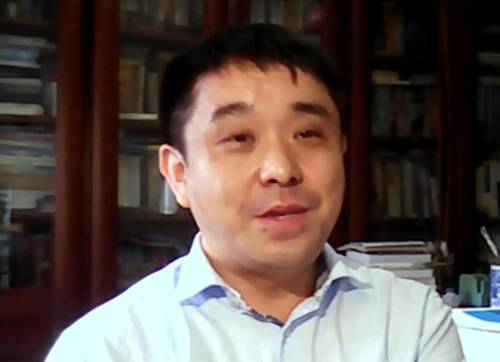
(Prof. Wang Zhanpeng)
The sixth speaker Li Jianbo from NUIST addressed under the title of The Extension of Foreign Literature Studies to International Studies, where he pointed out that international and regional studies should avoid staying put on the international relationship superficially, nor should they be confined to concepts. Instead, attention should be paid to "unconscious things", that is, culture and literature studies at a strategic level. According to his own research experience, Professor Li presented the research object of strategic culture, a new perspective of strategic significance for international and regional studies.
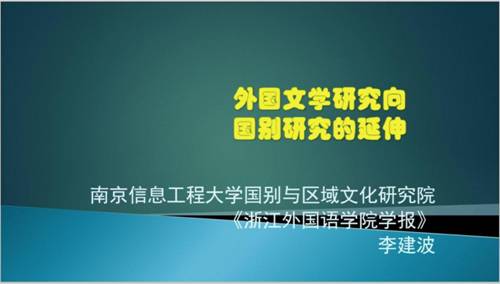
(Title of Prof. Li Jianbo’s Speech)
Prof. Li Chengjian, Dean of SFL of SWJTU, was the last speaker. As the director of ASC, she summarized the development of national studies platforms in SWJTU as Construction of International and Regional Research PlatformS of Southwest Jiaotong University (2016-2020).
Taking the ASC and European Studies Center(ESC) as objects, her report consisted of four parts: the history of the centers, the development of the centers over the past five years, how SWJTU and SFL supported platform building, and problems and lessons from the building. She elaborated the history, development and positioning of ASC and ESC, analyzed their building process and multi-support, and in the end discussed the problems occurred in the process of exploration and construction of the two research centers.
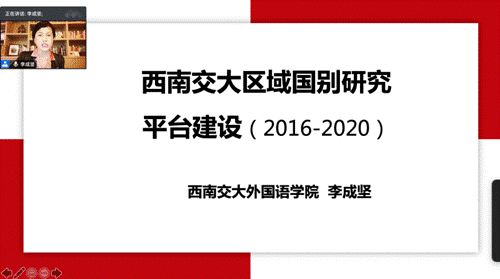
(Title of Prof. Li Chengjian’s Speech)
The President Forum drew to a close after the seven penetrating speeches. The host, Prof. Sun Xiaomneng, gave a brief summary on the forum in her closing speech, where she pointed out, with a leading role in the front line of building foreign language discipline, we should meet the needs of a new era to conduct international and regional research. In China, the research is different from its counterpart in UK which is derived from classics and natural history, or the US mode as political products, which required a methodology menaced with Chinese characteristics.
She said, there was a long way to go with many issues to be addressed. This president forum, with active participation, earnest discussion and exchange of views, was highly productive and fruitful. At last, Professor Sun extended her heart-felt gratitude to all the guests and scholars for their support and participation.
The second round of the keynote speech forum began at 8:30 a.m., august 16, hosted by Professor Liu Lening from Columbia University and joined by 5 speakers.
The first keynote speech was A Brief Review of the Study of Classical Chinese Literature in America delivered by professor Liang Xia from Washington University in St.louis. At first, she summarized the development of the study of classical Chinese literature in America, followed by the introduction of several characteristics of the study, such as the emphasis on the study of Chinese literature, related theories and methodologies, specific writers and the English translation of literature work. She then looked into the future development of the study of classical Chinese literature in America, believing the future would see a broader study under this topic. American scholar will tend to publish articles in Chinese so as to gain more readers. Chinese scholars would also engage in introducing Chinese literature and cultural products more actively to the West, and the development of China’s society will largely shape the American academic circle’s view and concern about China.
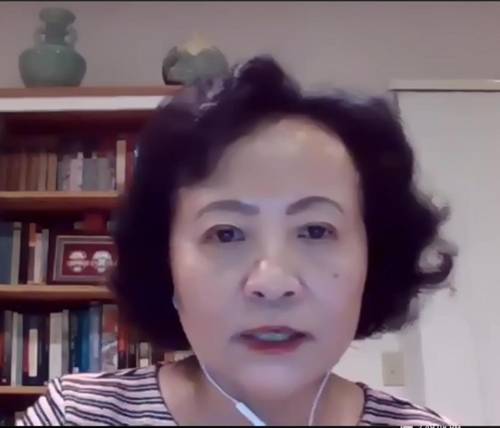
(Prof. Liang Xia)
The second speaker was Professor Fan Jinghua from Nanyang Technological University with his speech Form and Aura of the Poetic in American-Chinese Poetry Translation. To begin with, he briefed the audience on the definition of Form and Aura of the Poetic. He then discussed the translatability of the poetry. On the basis of the visibility and invisibility, he believed that the essence of the text can not be delivered by a low-quality translation. Therefore, translation can greatly influence the representation of the poetic. He then elaborated on how to represent or highlight the form and aura of the poetic in three aspects, namely, the context of the source language and targeted language, the visuality of the text and reading perception,and the generalization and specification of translation language. He also summarized the differences among time, space and gender empowerment. He concluded that the individualized translation was the purpose of and ideal for poetry translation.

(Prof. Fan Jinghua)
The third speech, Issues of Chinese Teaching in the United States and Sino-Us Humanities Exchanges in this Turbulent Time, was given by Professor Chu Chengzhi from University of California Davis. He pointed out that the Covid-19 has triggered many changes to people’s life, international politics and humanism. Then, with an analysis on the influence of the pandemic on spacial isolation and online education, he highlighted the importance of humanistic environment and cultural understanding, and gave his advice on building a favorable humanistic environment for online education. He believed that in terms of student’s study, both teacher and staff of international Chinese language teaching programs should give full consideration into the equal access to education resources and different cultural philosophies in every country, and face the challenges with prudence. He concluded his speech by outlining the measures to be taken in international Chinese language teaching class and by teachers in face of the pandemic.
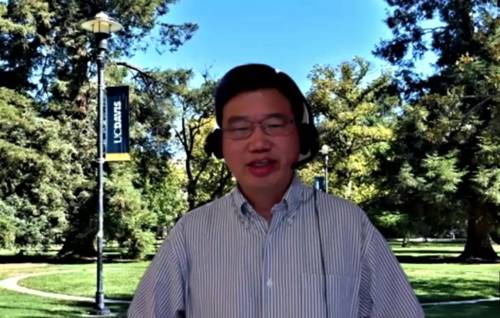
(Prof. Chu Chengzhi)
The forth speaker was professor Jie Zhang from Trinity University. Her speech was The Study and Reception of Chinese-Language Film in American. She first analyzed the image of the Chinese-language film in the view of ordinary Americans by listing some characters in the famous films. She said, digital videos tears away the audience from the touchable experience, therefore, people are likely to make arbitrary judgements of unfamiliar persons or things, which can also be seen in cross-cultural communication. As a result, what Americans leaned about China through films has been superficial and symbolized. She then talked about the concept of Chinese-language film and film-related courses offered in American universities. Finally, she emphasized that taking Chinese-language film courses can not only help American students to learn about China, but also enhance their critical thinking and sympathy.
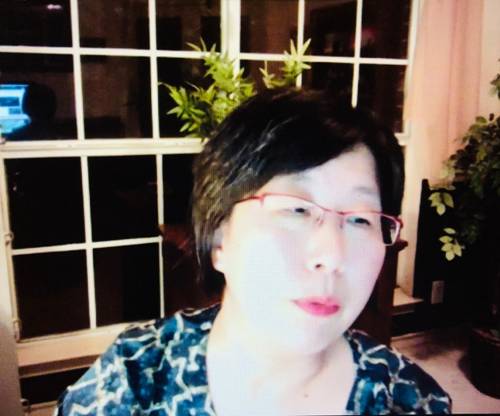
(Prof. Jie Zhang)
The last speech Discursive formation of the covid-19 in Trump’s Oval Office Speech was given by Associate Professor Li Zhou from SWJTU. She analyzed word by word the first oval office speech by the U.S. President Donald Trump on Covid-19 via textual analysis approach, and identified the two themes of his speech, “The Here Trump” and “The Glory of the Trump Administration”. She explored the environment shaping these two themes under the guidance of Foucault’s Discursive formation. She then highlighted the existing argument that “the style of Trump’speech is defined by his characteristics” was narrow-minded and superficial without a in-depth study against the historical background. It can be found by studying his rhetorical formation of the the coronavirus outbreak that Trump’s discourse style was not shaped individually or in isolation. Instead, it was rich in American characteristics of this time. It required a systematic study against the social and cultural background, even with a eye on science and tech development. Only by this approach can we fully understand the cultural meaning and the power relations of Trump’s speech.
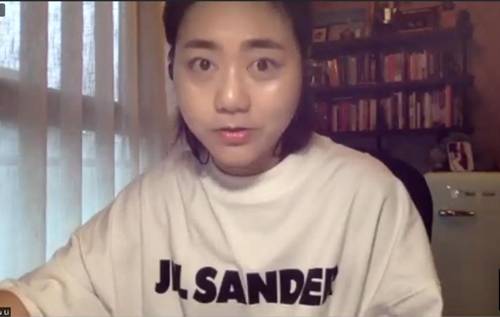
(Associate Prof. Li Zhou)
Five speakers also answered the questions of the audience in discussion session.
The meeting was drawing to a close after the second round of keynote speech forum. Yu Senlin, Deputy Dean of the SFL, SWJTU, delivered the closing remarks. He summarized each speech and extended sincere gratitude to all the attendees for their participation in the this on-line meeting. He stressed the best way to reduce the misunderstandings between China and the US and tackle with the changes in Sino-America relations was to strengthen humanistic foundation and cross-cultural understanding. He specifically thanked Professor Chu Chengzhi and Professor Liu Lening for their arranging and presiding this meeting, and the organizers and staff for their work and support. As a conclusion, he sent his best wishes for the Center for American Studies to scale new heights in the future.
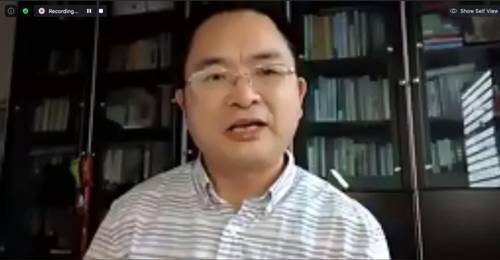
Yu Senlun,associate dean of the foreign languages,SWJTU, delivering the Closing remarks.
The Third International Conference on Humanistic Foundation and Cross-cultural Understanding of Sino-American Relations was successfully finished in the applause of all the participants.
Written by: Ren Xiankai; Liang Yushan; Wu Yuanyuan; Xie Junyu
Translated by: Xia Jianxin